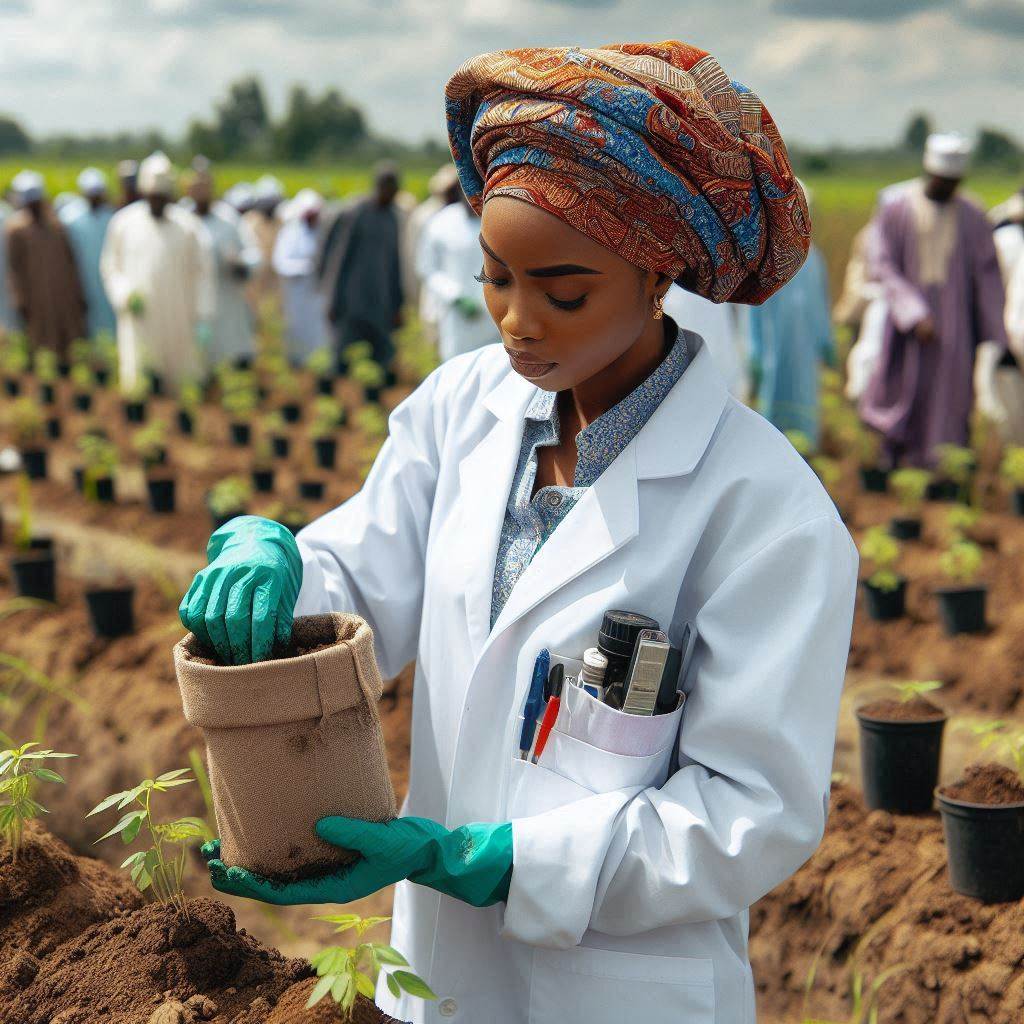Introduction
In Nigeria, agricultural extension services and education play a crucial role in enhancing agricultural practices among farmers.
These services provide valuable information, skills, and technologies to farmers, helping them improve productivity and income.
Brief Overview of Agricultural Extension Services and Education
Agricultural extension services in Nigeria involve the dissemination of agricultural information, training, and support to farmers by extension agents.
These services aim to bridge the gap between research institutions and farmers, facilitating the adoption of innovative practices.
Importance of Agricultural Extension Services
Agricultural extension services are essential for promoting sustainable agricultural practices in Nigeria.
By providing farmers with up-to-date information on best practices, market trends, and climate-smart techniques, these services help farmers increase their yields, reduce post-harvest losses, and adapt to changing environmental conditions.
Purpose of the Blog Post
This blog post aims to highlight the significance of agricultural extension services and education in Nigeria.
It will explore the role of extension services in supporting farmers, promoting sustainable agriculture, and enhancing food security in the country.
Historical background of agricultural extension services in Nigeria
Establishment of Agricultural Extension Services in Nigeria
Agricultural extension services in Nigeria began during the colonial period.
The British administration established these services to improve agricultural productivity.
The primary goal was to introduce modern farming techniques to local farmers and enhance crop yields.
The first agricultural extension services focused on cash crops like cocoa, palm oil, and groundnuts.
The establishment of agricultural research institutes followed.
These institutes included the Moor Plantation in Ibadan and the Institute of Agricultural Research in Zaria.
They provided a foundation for agricultural extension services by conducting research and disseminating knowledge.
Evolution of Agricultural Education and Extension Services in the Country
Post-independence, Nigeria recognized the need to expand and improve agricultural extension services.
The Nigerian government took over and restructured existing colonial systems.
They established the National Agricultural Extension and Research Liaison Services (NAERLS) in 1963.
NAERLS aimed to integrate research findings into practical farming techniques and deliver these to farmers.
The 1970s saw significant developments with the introduction of Agricultural Development Projects (ADPs).
These projects focused on providing comprehensive support to farmers, including extension services, input supply, and infrastructural development.
ADPs aimed to bridge the gap between research institutions and farmers, ensuring the adoption of improved agricultural practices.
Agricultural education also evolved during this period.
Universities and colleges began offering specialized courses in agricultural sciences and extension services.
Institutions like the University of Ibadan and Ahmadu Bello University played crucial roles in training future agricultural extension officers and researchers.
Key Milestones in the Development of Agricultural Extension Services
Several key milestones marked the development of agricultural extension services in Nigeria.
The establishment of the Federal Department of Agricultural Extension (FDAE) in 1988 was a significant step.
FDAE aimed to coordinate and standardize extension activities across the country, ensuring consistency and quality.
Another milestone was the introduction of the Agricultural Transformation Agenda (ATA) in 2011.
This agenda focused on modernizing Nigeria’s agriculture through improved extension services, access to credit, and market development.
ATA emphasized the importance of agricultural extension services in achieving food security and economic growth.
In recent years, technology has played an increasingly important role in agricultural extension services.
The use of mobile phones, radio, and internet platforms has expanded the reach of extension services.
Farmers now have better access to real-time information, weather forecasts, and market prices, enhancing their decision-making processes.
In a nutshell, the historical background of agricultural extension services in Nigeria highlights their evolution from colonial beginnings to a robust, modern system.
Key milestones, including the establishment of NAERLS, ADPs, and the introduction of ATA, have shaped the current landscape.
Continuous improvements in agricultural education and the integration of technology have further strengthened Nigeria’s agricultural extension services.
These developments underscore the critical role of extension services in boosting agricultural productivity and ensuring sustainable development in Nigeria.
Read: Online Courses in Curriculum Studies Nigeria
Role of agricultural extension services in rural development
When it comes to agricultural development in Nigeria, agricultural extension services play a crucial role.
These services are vital in disseminating valuable information and technologies to farmers, ultimately improving agricultural productivity and rural livelihoods.
Importance of agricultural extension services in improving agricultural productivity
- Extension services provide farmers with up-to-date information on best practices.
- They offer guidance on proper land use, crop selection, and pest management.
- Extension agents help farmers adopt modern technologies for increased productivity.
- They conduct training programs to improve farmers’ skills and knowledge.
- Extension services facilitate access to resources like seeds, fertilizers, and equipment.
Impact of agricultural extension services on rural livelihoods
- Extension services help farmers diversify their crops for a stable income.
- They promote sustainable farming practices for long-term livelihood security.
- Extension agents assist in linking farmers to markets for better access to buyers.
- By improving productivity, extension services enhance household incomes in rural areas.
- They empower farmers with knowledge to mitigate risks and adapt to climate change.
Role of extension agents in disseminating agricultural information and technology to farmers
- Extension agents act as intermediaries between researchers and farmers.
- They provide on-site demonstrations of new agricultural practices and technologies.
- Extension agents offer personalized advice tailored to each farmer’s needs.
- They organize farmer field days and workshops to share knowledge and experiences.
- Agents facilitate farmer groups for collective learning and resource-sharing.
Generation, agricultural extension services are indispensable for rural development in Nigeria.
These services not only improve agricultural productivity but also have a significant impact on rural livelihoods.
Extension agents play a crucial role in bridging the knowledge gap between researchers and farmers, disseminating valuable information and technologies.
With continued support and investment in agricultural extension services, Nigeria can achieve sustainable agricultural development and improve the lives of rural communities.
Read: Tech-Enhanced Learning in Nigerian Schools
Challenges facing agricultural extension services in Nigeria
When it comes to agricultural extension services in Nigeria, there are several challenges that hinder the effectiveness and impact of these programs.
Below are some of the key challenges facing agricultural extension services in Nigeria:
Lack of adequate funding for agricultural extension programs
One of the major challenges facing agricultural extension services in Nigeria is the lack of adequate funding.
Many extension programs rely on government funding, which is often insufficient to meet the needs of the agricultural community.
This results in limited resources for training, equipment, and outreach efforts, making it difficult to provide the necessary support to farmers.
Shortage of trained extension agents
Another significant challenge is the shortage of trained extension agents in Nigeria.
There is a lack of qualified professionals who can effectively deliver extension services to farmers.
This shortage is particularly acute in rural areas, where the majority of farmers reside.
Without enough trained agents, it is difficult to reach all farmers and provide them with the information and support they need to improve their farming practices.
Limited access to agricultural information and technology in rural areas
Access to agricultural information and technology is also a major challenge for agricultural extension services in Nigeria.
Many rural areas lack the infrastructure and resources needed to access up-to-date information and new technologies that could help improve agricultural practices.
This limited access hinders the ability of extension services to provide farmers with the latest techniques and best practices, ultimately limiting their impact on the agricultural sector.
Essentially, these challenges facing agricultural extension services in Nigeria highlight the need for increased investment, training, and access to information and technology.
Addressing these challenges will be crucial in improving the effectiveness and reach of extension services, ultimately leading to better outcomes for Nigerian farmers and the agricultural sector as a whole.
Read: Tech Tools for Nigerian Curriculum Developers

Initiatives and programs to improve agricultural extension services in Nigeria
Government-Led Initiatives to Strengthen Agricultural Extension Services
The Nigerian government has launched various initiatives to strengthen agricultural extension services.
These efforts aim to enhance farmers’ access to modern agricultural practices and technologies.
One notable initiative is the Agricultural Transformation Agenda (ATA).
This program seeks to increase agricultural productivity by improving extension services across the country.
ATA focuses on developing a robust extension system that bridges the gap between research and farmers.
The government also supports the National Agricultural Extension and Research Liaison Services (NAERLS).
NAERLS works to improve the effectiveness of extension services through research, training, and the dissemination of agricultural information.
Additionally, the government collaborates with state agricultural development programs to ensure localized support for farmers.
Partnerships with NGOs and International Organizations to Enhance Extension Services
Partnerships with non-governmental organizations (NGOs) and international organizations play a crucial role in enhancing agricultural extension services in Nigeria.
NGOs like the Sasakawa Africa Association (SAA) provide technical support and resources to extension agents.
These partnerships help scale innovative agricultural practices and technologies to a broader audience.
International organizations, such as the Food and Agriculture Organization (FAO) and the World Bank, also contribute significantly.
They fund projects aimed at improving extension services and offer training programs for extension agents and farmers.
These collaborations bring global expertise and resources to local farming communities, enhancing the overall impact of extension services.
Training Programs for Extension Agents and Farmers to Improve Skills and Knowledge
Training programs are essential for equipping extension agents and farmers with the skills and knowledge needed for modern agriculture.
The Nigerian government, along with NGOs and international partners, organizes regular training sessions.
These programs cover various aspects of agriculture, including crop management, pest control, and sustainable farming practices.
The Federal Ministry of Agriculture and Rural Development (FMARD) plays a pivotal role in these training initiatives.
FMARD conducts workshops and seminars to update extension agents on the latest agricultural technologies and methods.
This continuous learning process ensures that extension agents can effectively support farmers.
Furthermore, farmer field schools are a popular method for training farmers directly.
These schools provide hands-on training in real farm settings, allowing farmers to learn by doing.
This approach has proven effective in promoting the adoption of new agricultural practices among farmers.
Ultimately, improving agricultural extension services in Nigeria requires a multifaceted approach.
Government-led initiatives, partnerships with NGOs and international organizations, and comprehensive training programs are all crucial components.
By strengthening these areas, Nigeria can enhance its agricultural productivity and ensure food security for its growing population.
The collective efforts of the government, NGOs, international organizations, and local communities are vital in driving the progress and sustainability of agricultural extension services in Nigeria.
Read: Nigerian Curriculum Studies Academic Journals
Success stories of agricultural extension services in Nigeria
Case studies of communities that have benefitted from agricultural extension services
One such community is Oko-Oba in Lagos State, where farmers received training on modern farming techniques.
The extension agents provided them with knowledge on soil management, crop rotation, and pest control.
As a result, the farmers were able to increase their crop yield significantly and improve their livelihoods.
Another success story is the community of Kano in the northern part of Nigeria.
Farmers in this region were struggling with low crop yields due to poor farming practices and lack of knowledge.
Through the agricultural extension services provided by the government, they were trained on best practices.
This led to a significant increase in their crop yields and income generation, transforming their lives for the better.
Impact of extension services on crop yields and income generation
The impact of agricultural extension services on crop yields and income generation in Nigeria cannot be overstated.
Farmers who have access to these services have reported a significant increase in their crop yields.
This is due to the knowledge and skills they acquire through training on modern farming techniques.
As a result, they are able to produce more crops and improve their income generation, lifting themselves out of poverty.
The extension services also play a crucial role in empowering farmers to adopt sustainable agricultural practices.
By promoting techniques such as organic farming and integrated pest management, farmers are able to protect the environment.
This not only benefits the farmers themselves but also ensures the long-term sustainability of agriculture in Nigeria.
Testimonials from farmers who have participated in extension programs
“I used to struggle with low crop yields and barely make enough to feed my family,” says Alhaji Ibrahim, a farmer from Kaduna.
“But ever since I participated in the agricultural extension program, my yields have doubled, and I now have surplus to sell.”
Ibrahim’s story is just one of many testimonials from farmers who have benefitted from extension services.
Another farmer, Mrs. Funke Adeleke from Ogun State, shares her experience: “I was skeptical at first, but the training I received changed my farming practices.”
“Now, I am not only able to feed my family, but I also sell my surplus crops at the market and earn a decent income.”
These testimonials highlight the transformative impact of agricultural extension services on farmers in Nigeria.
Through training, support, and knowledge-sharing, farmers are able to improve their crop yields, increase their income, and ultimately enhance their quality of life.
Importance of integrating agricultural education in schools
Importance of Agricultural Extension Services in Improving Agricultural Productivity
Agricultural extension services play a crucial role in improving agricultural productivity in Nigeria.
These services provide farmers with essential knowledge and skills to adopt modern farming techniques.
Extension services introduce farmers to high-yield crop varieties, effective pest management, and efficient irrigation methods.
By adopting these practices, farmers can increase their crop yields and overall farm productivity.
Moreover, extension services help farmers optimize their use of inputs like fertilizers and pesticides.
Proper guidance on input usage not only enhances crop productivity but also reduces costs and environmental impact.
Through regular training and field demonstrations, extension agents equip farmers with the tools they need to maximize their farm outputs and achieve better results.
Impact of Agricultural Extension Services on Rural Livelihoods
The impact of agricultural extension services extends beyond productivity; they significantly improve rural livelihoods.
By increasing crop yields and farm incomes, extension services enhance food security and economic stability in rural areas.
Farmers who adopt improved practices experience better harvests, which leads to higher incomes and improved living standards.
Agricultural extension services also promote diversification of income sources.
They introduce farmers to alternative enterprises like poultry farming, fish farming, and agro-processing.
Diversification helps farmers reduce risks and increase their income streams, contributing to overall rural development.
Furthermore, extension services empower women and youth by providing them with opportunities to engage in agricultural activities.
This empowerment leads to greater participation in the agricultural sector and contributes to the social and economic development of rural communities.
Role of Extension Agents in Disseminating Agricultural Information and Technology to Farmers
Extension agents are pivotal in disseminating agricultural information and technology to farmers.
They act as intermediaries between research institutions and farmers, translating scientific findings into practical applications.
By conducting field visits, demonstrations, and training sessions, extension agents ensure that farmers understand and adopt new technologies.
Extension agents also provide ongoing support to farmers, helping them troubleshoot problems and optimize their farming practices.
This continuous support is vital for sustaining productivity improvements and ensuring the long-term success of agricultural interventions.
In addition to face-to-face interactions, extension agents use various communication tools to reach farmers.
Mobile phones, radio programs, and farmer field schools are some of the methods used to disseminate information.
These tools help bridge the gap between extension services and farmers in remote areas.
In short, agricultural extension services are indispensable for rural development in Nigeria.
They improve agricultural productivity, enhance rural livelihoods, and empower farmers through the dissemination of information and technology.
Extension agents play a critical role in this process, ensuring that farmers have access to the knowledge and tools they need to succeed.
By strengthening agricultural extension services, Nigeria can achieve sustainable rural development and improve the quality of life for its rural population.
Future prospects for agricultural extension services in Nigeria
As Nigeria seeks to further develop its agricultural sector, there are several potential areas for growth and improvement in agricultural extension services.
Potential areas for growth and improvement in agricultural extension services
- Expansion of extension services to reach more rural farmers.
- Increased collaboration between extension agents, farmers, and other stakeholders.
- Enhancing the skills and knowledge of extension agents through continued training.
- Integration of gender-sensitive approaches in extension programs.
- Utilizing innovative communication methods to disseminate information to farmers.
Role of technology in advancing agricultural extension services
Technology plays a crucial role in advancing agricultural extension services in Nigeria. For instance, the use of mobile phones and the internet can facilitate the timely dissemination of information to farmers.
Furthermore, agricultural apps and software can provide farmers with valuable insights and data to improve their farming practices. Drones and other modern technologies can also be utilized for field monitoring and data collection.
Strategies to overcome challenges and enhance the impact of extension programs
- Investment in infrastructure and resources for extension services.
- Strengthening partnerships between government, NGOs, and private sector organizations.
- Improving coordination and communication among different extension service providers.
- Regular monitoring and evaluation of extension programs to ensure effectiveness.
- Promoting farmer participation and feedback in the design and implementation of extension services.
Most importantly, the future of agricultural extension services in Nigeria holds great promise.
By focusing on areas for growth and improvement, leveraging technology, and implementing effective strategies, the impact of extension programs can be enhanced to support the sustainable development of the agricultural sector.
Conclusion
Agricultural extension services and education are vital for Nigeria’s agricultural productivity and rural development.
They empower farmers with the knowledge and skills needed to enhance productivity and livelihoods.
By providing access to modern farming techniques, improved crop varieties, and effective resource management, extension services significantly boost agricultural outputs.
This, in turn, contributes to food security, economic stability, and overall rural development.
Stakeholders must support and invest in agricultural extension services to ensure sustainable agricultural growth and food security.
Government bodies, private sector players, NGOs, and international organizations all have roles to play.
Collaborative efforts can lead to better-funded, more effective extension programs that reach every farmer, even in the most remote areas.
By prioritizing these investments, Nigeria can achieve a more resilient and prosperous agricultural sector.
To further understand the impact and development of agricultural extension services in Nigeria, consider exploring resources like the National Agricultural Extension and Research Liaison Services (NAERLS) reports.
These reports offer comprehensive insights into the strategies and outcomes of extension services across the country.
Additionally, publications from the Federal Ministry of Agriculture and Rural Development (FMARD) provide valuable data and analyses on the state of agricultural extension in Nigeria.




